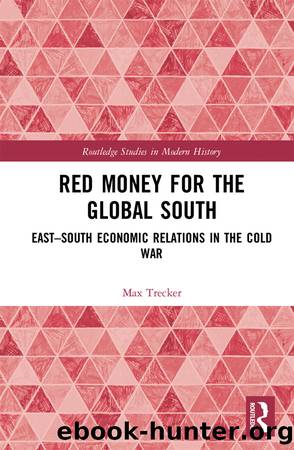Red Money for the Global South by Max Trecker

Author:Max Trecker [Trecker, Max]
Language: eng
Format: epub
Tags: History, World, Europe, Eastern, Russia & the Former Soviet Union, Africa, General
ISBN: 9781000037425
Google: I73RDwAAQBAJ
Publisher: Routledge
Published: 2020-02-20T03:41:38+00:00
Relations with Iraq
One country that took center stage in particular during the first half of the 1970s in the CMEA negotiations was Iraq. The relationship between the Soviet Union and Iraq had started in 1958 after a successful Baâathist coup. The Iraqi Baâathist Party was on the surface similar to its Syrian counterpart, but was often at odds with its sibling in Damascus. The Iraqi Baâathists were further away from âscientific socialismâ than their Syrian counterparts rejecting class struggle and calling for national unity. Nevertheless, the partyâs program from 1968 called for friendship between the Eastern Bloc and Iraq based on anti-Western sentiments and âanti-Imperialism.â11 In 1972, the Iraqi government signed a treaty of friendship and cooperation with the Soviet Union which gave the Iraqi side the necessary backing to nationalize the oil industry. This didnât coincide with a closer ideological alignment, as the new Iraqi strongman, Saddam Hussein, didnât sympathize with the Soviet version of communism. Nevertheless, the CP of Iraq was legalized again in 1973 and a national front was formed, measures which had merely symbolical value.12
Relations cooled down again in the mid-1970s when the sprawling oil trade enabled the Iraqi leadership to diversify its economic and political partners and drew it closer to the West again. The Baâath regime had reached a final settlement with the former private oil companies in 1973 which allowed the Iraqi side to market its own oil.13 The nationalization of the oil industry came at the right time to profit from the price increases of the 1970s. The Iraqi leadership could afford to import Western as well as Eastern civil and military goods on an unprecedented scale. In 1978, Saddam Hussein, fearing a Communist plot under Soviet guidance, ordered Iraqi Communists tracked down once more.14 Mutual relations recovered again but this shows that the relations between the Eastern Bloc and Iraq constituted no patronâclient relationship, as the Iraqi side could exercise a considerable amount of leverage.
It is interesting to follow the ascendance in importance of Iraq for the CMEA member countries. While the prospects of Iraq were judged as being rather doubtful during the 1960s, this changed rapidly after the nationalization of the oil industry and the sharp increases in commodity prices following the first oil shock. Iraq increasingly became an issue for discussion inside the CMEA and the PCTA in the late 1960s. The CMEA member states were approving the fact that their share in Iraqâs foreign trade had increased from 12.9 % in 1964 to 22.9 % in 1968. They furthermore approved of the foreign policy actions of the Iraqi government which stated its opposition towards the West and employed a positive attitude towards the East.15
However, trade in the late 1960s, although increasing, remained rather marginal. Hungary, to make a case in point, rarely imported goods worth more than 0.2 million US dollars during the 1960s from Iraq, while its exports equaled four million US dollars.16 The import numbers for the Polish economy were similar, while exports were slightly higher.17 In the case of East Germany trade with Iraq remained marginal during the entire decade.
Download
This site does not store any files on its server. We only index and link to content provided by other sites. Please contact the content providers to delete copyright contents if any and email us, we'll remove relevant links or contents immediately.
Man-made Catastrophes and Risk Information Concealment by Dmitry Chernov & Didier Sornette(6002)
The Revenge of Geography: What the Map Tells Us About Coming Conflicts and the Battle Against Fate by Kaplan Robert D(4066)
Zero Waste Home by Bea Johnson(3833)
COSMOS by Carl Sagan(3617)
Good by S. Walden(3547)
In a Sunburned Country by Bill Bryson(3536)
The Fate of Rome: Climate, Disease, and the End of an Empire (The Princeton History of the Ancient World) by Kyle Harper(3055)
A Wilder Time by William E. Glassley(2855)
Camino Island by John Grisham(2793)
Organic Mushroom Farming and Mycoremediation by Tradd Cotter(2686)
The Ogre by Doug Scott(2679)
Human Dynamics Research in Smart and Connected Communities by Shih-Lung Shaw & Daniel Sui(2499)
Energy Myths and Realities by Vaclav Smil(2486)
The Traveler's Gift by Andy Andrews(2455)
9781803241661-PYTHON FOR ARCGIS PRO by Unknown(2365)
Inside the Middle East by Avi Melamed(2349)
Birds of New Guinea by Pratt Thane K.; Beehler Bruce M.; Anderton John C(2249)
A History of Warfare by John Keegan(2238)
And the Band Played On by Randy Shilts(2197)
